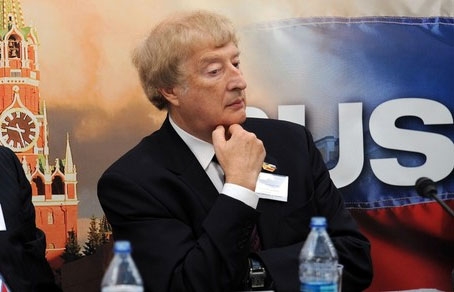
It’s time to end the outdated view of Moscow as an enemy
By Edward Lozansky and Gilbert Doctorow - - Tuesday, January 31, 2017
From all indications, Moscow viewed last Saturday’s phone call between Russian President Vladimir Putin and U.S. President Donald Trump as a successful first step that might well lead to a lessening of tensions between the two countries. The present and past chairmen of the Duma’s foreign relations committee were bullish, as was Dmitry Kiselyov, the lead news presenter on Russian state television, during his Sunday News wrap-up.
President Trump is still operating without a confirmed Cabinet and his many critics believe he is simply "winging it,” but many in Russia welcome what they see as a welcome coherency in Mr. Trump’s domestic and foreign policy stands, as well as clear understanding of how they fit together. "Making America great again,” as an example, has important international trade and foreign policy components, as he clearly recognizes.
Its military component assumes an end to wars of choice that have wreaked havoc abroad while depleting the U.S. Treasury. Mr. Trump seems to recognize that a relatively tranquil global stage, which will allow the United States to address properly its domestic economic and social needs, requires a concentration both on maintaining U.S. military strength and on improving relations with the other two powers that belong to the elite club of military or economic super powers, Russia and China.
A trilateral summit between the leaders of United States, Russia and China makes sense and Beijing, which is facing its own problems internally, would be wise to join the anti-terror coalition as a goodwill gesture toward Washington and Moscow. Such a summit might lead to a transition to real world policies in which nations deal with each other as they are rather than trying aggressively, as some in the U.S. have advocated, to change them through external pressure or what is euphemistically called "regime change” into what others wish they were.
Over the past 25 years, the bipartisan, collective view of the U.S. defense and foreign policy establishment closed itself to all out-of-the-box thinking. Those who would not uphold the Washington consensus were systematically blacklisted by those in public authority. Now many champions of U.S. aggressiveness abroad are moving out as a new president is looking to a foreign and defense policy that based not on ideology, but his country’s national security interests. It remains to be seen, of course, whether their replacements will be as stiff-necked and indifferent to outside input, but the early signs give one reason to hope.
Mr. Trump said at his inauguration that his accession to the presidency represents a transfer of power from the nation’s old elites to the people he says he represents. That may be an exaggeration when the subject is formulation of foreign policy, but bringing the public into broad and open discussion of the key security issues of our times is not only consistent with populism but also consistent with best practices to deliver optimal results.
While waiting for a Cabinet, Mr. Trump has apparently been seeking counsel from several old-timers, big names from the GOP hall of fame who were correct when suggesting less aggressive talk and very specific nuclear weapons reduction agreements. However, as a group they all seem trapped by an image of Russia burned into their thinking during the Soviet era, which requires them to view Moscow’s every action as aggressive, hostile and aimed at undermining U.S. interests. In reality, the Communist expansionist policies of the Soviet era are to all but those trapped in such thinking but a distant memory, and it’s time to think seriously about including Russia as a possible ally and friend rather than an eternal adversary and enemy.
Although the public in the United States, like the public in today’s Russia, wants nothing more than to live in a peaceful world, the debate being forced by the new president will perhaps for a time focus not on the broad public, but on the media, think tanks, university forums and the like still dominated by those living in the past. A good start toward creating a level playing field would be a U.S. audit of the federally funded nominal nongovernmental organizations advocating "regime change” in nations with which the U.S. seeks friendlier relations. There can be little doubt the efforts of such groups using U.S. tax dollars to undermine governments they don’t like and to interfere in elections in other countries has made many world leaders who should be friendly to Washington suspicious and even afraid of the consequences of dealing with the U.S.
The foreign policy revolution that Donald Trump has invited will require the intellectual inputs from a great many thinkers who have been on the outs and who hold different viewpoints among themselves. Only such a free and public exchange of ideas can ensure high-quality foreign and domestic policies from what promises to be a much-needed recalibration of national interest.
 Edward Lozansky is president of the American University in Moscow, Professor of Moscow Sate and National Research Nuclear Universities
Edward Lozansky is president of the American University in Moscow, Professor of Moscow Sate and National Research Nuclear Universities
 Gilbert Doctorow is the European Coordinator of the American Committee for East West Accord, Ltd. Gilbert Doctorow is a Research Fellow of the American University in Moscow
Gilbert Doctorow is the European Coordinator of the American Committee for East West Accord, Ltd. Gilbert Doctorow is a Research Fellow of the American University in Moscow




.jpg/250px-ElbeDay1945_(NARA_ww2-121).jpg)





